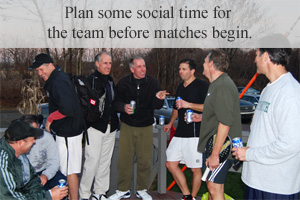The Foundations of Team Building
JAN VICTOR
SEPTEMBER 14, 2011
CHICAGO, IL
 “A boat doesn’t go forward if each one is rowing their own way.” Swahili proverb
“A boat doesn’t go forward if each one is rowing their own way.” Swahili proverb
It’s that time of year again. Summer heat is gone, the kids are back in school, and (perhaps most importantly for many of us) paddle season is starting. It’s time for a new team, a new paddle, and big expectations for a great season.
Each new season starts with the team, which means building a new dynamic of partners and teammates. The season’s success depends on bringing these players together to become a force that will blast the opponents off the court.
In the formation stage of team development, team members tend to behave independently of each other. They may not yet know each other well, so will focus more on themselves, their place on the team, and how they are being perceived by teammates. The team captain often hears requests such as, “I just want to play with someone better than me,” or “I really don’t want to play with _____.” But paddle is a team sport; this beginning period of preoccupation with one’s individual game is the perfect time to intentionally shape the identity of players together into an unstoppable team entity.
Here are three specific team-building exercises that will help your team succeed this season:
1. Plan some social time for the team before matches begin.
Rapport and trust are the foundations of successful teams. In the early stages of team development, specific opportunities should be set aside to discover shared interests. People are attracted to those who they can find common ground with -- from congruent social values to favorite TV shows. At casual social events, players are able to develop relationships, and eventually use this as the foundation for trust. Sharing a meal with your team is the perfect opportunity for such bonding (studies have shown that a bond occurs between those who share a positive experience, such as a meal). Have members talk to each other to discover hobbies, alma maters, kids, sports, and anything else they may have in common.
2. Create a team mission statement.
This brief declaration should define the values of the team members, what they want the team to be like, and what they hope the team will achieve. Team members should begin by considering these answers individually and discerning how their own values may fit into the context of the team’s mission statement. Then, as a group, members can bring these ideas into a discussion, which will also help the players to learn more about each other’s values. An easy way to start is by having each participant list her three most important values on a sheet of paper, then share them aloud with the group. Record each value and discuss which are listed most often. Together, determine how these values would translate into a team motto or mission statement.
3. Formulate a list of behaviors or actions that are expected of the members of the team.
The idea behind this is to identify and discuss potential conflicts before they occur. A good lead-in exercise is to have team members brainstorm behaviors that have caused team conflicts in the past. Then, as a group, discuss solutions that could prevent these conflicts from recurring. When potential conflicts are discussed before they happen, it lessens the likelihood that they will occur; by becoming aware of behaviors that cause offense, players can consciously avoid these behaviors. As a result, the trust level among team members will become stronger as personal or competitive conflicts are avoided—which leads to heightened focus on winning matches.
Jump-start your team’s development this season by intentionally focusing on team building and your season will be a success. When the focus shifts from self to team, from “I” to “we,” the team’s potential for greatness is unleashed.
Jan Victor is a leadership development coach and avid paddle player. Her team building workshop, TeamUP, promotes relationships and skill building for paddle teams.







